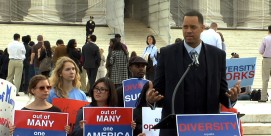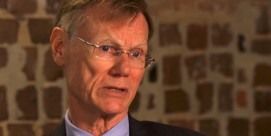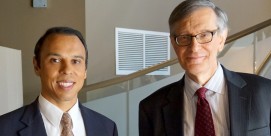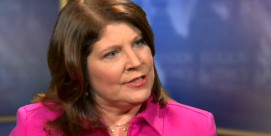TIM O’BRIEN, correspondent: Demonstrators on both sides of the issue filled the plaza outside the Supreme Court Tuesday (April 28). Some had been standing in line for four days in the hope they might get in to watch the historic arguments. Those who did found much the same passion inside from the lawyers and justices, although speaking in much lower voices.
All eyes were on Justice Anthony Kennedy, widely perceived to be the fifth vote in support of marriage equality. Kennedy is the author of the court's three landmark victories for gays and lesbians. But no sooner had the argument begun when Kennedy noted that same-sex marriage is a recent development and expressed misgivings about tinkering with a definition of marriage that had been around for millennia:
Justice Anthony Kennedy: I don’t even know how to count the decimals when we talk about millennia. This definition has been with us for millennia, and it's very difficult for the court to say, "Oh well, we know better.”
O’BRIEN: Was Kennedy having a change of heart? Justice Antonin Scalia—the court’s most forceful opponent of any constitutional recognition of same-sex marriage—jumped in asking the lawyer for gay couples:
Justice Antonin Scalia: Do you know of any society prior to the Netherlands in 2001 that permitted same-sex marriage?
Attorney Mary Bonauto (Lawyer for plaintiffs): As a legal matter, your Honor?
Justice Scalia: As a legal matter.
Bonauto: I—I am not. I am not.
Scalia: For millennia, not a single other society until the Netherlands in 2001, and you’re telling me they were all—I don't know what. And you're asking us to decide it for this society when no other society until 2001 ever had it!
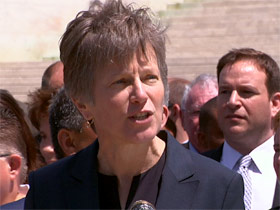
O’BRIEN: And when Attorney Mary Bonauto complained that states were denying a whole class of people the benefits of the institution of marriage, Chief Justice John Roberts took exception:
Chief Justice John Roberts: You're not seeking to join the institution, you’re seeking to change what the institution is. The fundamental core of the institution is the opposite-sex relationship, and you want to introduce into it a same-sex relationship.
O’BRIEN: Roberts also expressed concern that forcing states to recognize same-sex marriage would close off debate on a new and important societal issue. It was not going well for the proponents of same-sex marriage, whose lawyer got hammered by the more conservative Justices. But when the attorney representing states wanting to ban same-sex marriage rose to speak, the court's more liberal justices challenged him, too. Justice Stephen Breyer said the states had offered no logical justification for denying gays the right to marry:
Justice Stephen Breyer: So they have no possibility to participate in that fundamental liberty, that is, people of the same sex who wish to marry. And so we ask, “Why?" And the answer we get is “Well, people have always done it.” You know, you could have answered that one the same way we talk about racial segregation.
O’BRIEN: Attorney John Bursch, on behalf of the states, responded that marriage serves the states' interest in procreation. Several justices noted that many heterosexual couples don't have children and that many same-sex couples do.
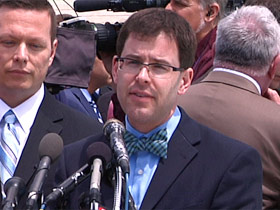
Although no formal announcement is expected before late spring, the justices met in their very private conference room the next day and tentatively decided the case. The vote is secret, it rarely changes, and there’s very little discussion. In fact, the only time all nine justices discuss the case in any depth is at the hearing in court. And sometimes justices will speak to one another through the lawyer. Listen as Justice Antonin Scalia raises a question about the possible religious ramifications of requiring states to allow same-sex marriage:
Justice Antonin Scalia: Is it conceivable that a minister who is authorized by the state to conduct marriage can decline to marry two men if indeed this court holds that they have a constitutional right to marry? He's an instrument of the state. I don’t see how you could possibly allow that minister to say, “I will only marry a man and a woman. I will not marry two men.”
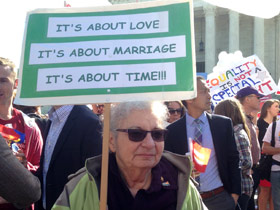
O’BRIEN: Other justices took over the conversation:
Justice Sonya Sotomayor: Counselor, there have been anti-discrimination laws in various states, correct?
Attorney Mary Bonauto: Yes, your honor.
Justice Sotomayor: Anti-discrimination laws regarding gay people.
Bonauto: Correct.
Justice Sotomayor: And in any of those states, have ministers been forced to do gay marriages?
Bonauto: Of course not, Your Honor.
Justice Stephen Breyer: It's called Congress shall make no law respecting freedom of religion.
O’BRIEN: After two-and-a-half hours in court, the arguments continued outside:
Attorney John Bursch (Lawyer for Michigan): What this case is really about is love and democracy. I think what we talked about today is that you can love your neighbor no matter what their sexual orientation is—what choices they make about their life—and still have a disagreement about what marriage means. And the question is who gets to decide the meaning of marriage? Is it people acting through the democratic process, or is it the federal courts? And our position has been it's the people.
Attorney Mary Bonauto: The Constitution promises equal protection and due process and liberty to all right now. It's not a popularity contest. The court absolutely—it's their job—to make sure that every individual's liberty and equality is protected regardless of state laws. I wish—I certainly said that in the states where marriages happen, what happens is that people see the joy, they see the commitment, and they come to support the marriages.
O’BRIEN: Most of the justices, at one point or another, expressed deep misgivings about forcing states to allow same-sex marriage. They do have a fallback position: requiring those states that do not allow same-sex marriage to at least recognize the marriages performed in those states that do—a compromise that neither side wants, but one that might allow the court to revisit the issue at a later date.
For Religion & Ethics NewsWeekly, I'm Tim O'Brien in Washington.




